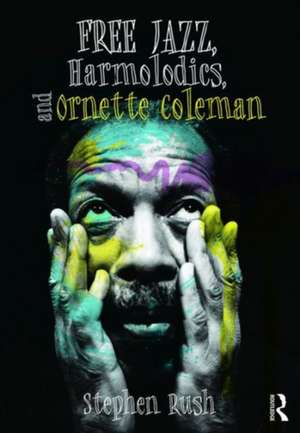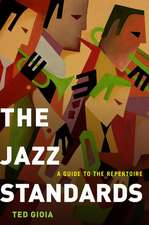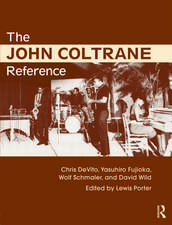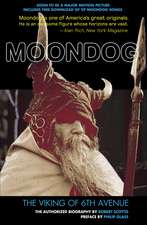Free Jazz, Harmolodics, and Ornette Coleman
Autor Stephen Rushen Limba Engleză Paperback – 17 noi 2016
Included here are detailed musical analyses of improvisations, accompanied by full transcriptions. Intimate interviews between the author and Coleman explore the deeper issues at work in Harmolodics, issues of race, class, sex, and poverty. The principle of human equality quickly emerges as a central tenet of Coleman’s life and music. Harmolodics is best understood when viewed in its essential form, both as a theory of improvisation and as an artistic expression of racial and human equality.
| Toate formatele și edițiile | Preț | Express |
|---|---|---|
| Paperback (1) | 328.20 lei 6-8 săpt. | |
| Taylor & Francis – 17 noi 2016 | 328.20 lei 6-8 săpt. | |
| Hardback (1) | 772.36 lei 6-8 săpt. | |
| Taylor & Francis – 2 dec 2016 | 772.36 lei 6-8 săpt. |
Preț: 328.20 lei
Preț vechi: 373.15 lei
-12% Nou
Puncte Express: 492
Preț estimativ în valută:
62.81€ • 64.89$ • 52.27£
62.81€ • 64.89$ • 52.27£
Carte tipărită la comandă
Livrare economică 25 martie-08 aprilie
Preluare comenzi: 021 569.72.76
Specificații
ISBN-13: 9781138122949
ISBN-10: 1138122947
Pagini: 318
Dimensiuni: 178 x 254 x 23 mm
Greutate: 0.59 kg
Ediția:1
Editura: Taylor & Francis
Colecția Routledge
Locul publicării:Oxford, United Kingdom
ISBN-10: 1138122947
Pagini: 318
Dimensiuni: 178 x 254 x 23 mm
Greutate: 0.59 kg
Ediția:1
Editura: Taylor & Francis
Colecția Routledge
Locul publicării:Oxford, United Kingdom
Cuprins
Part 1
1. Historical Context
2. An Introduction to Harmolodics
3. Transposition and Harmolodics
4. A Definition of Harmolodics: The Shape of Jazz to Come
5. An Argument for a Harmolodic Approach to Jazz Instruction
Part 2
6. An Interview with Ornette Coleman, with Reflections
7. Post-Interview Reflections
Part 3
8. Analysis and Transcription of Harmolodic Compositions
1. Historical Context
2. An Introduction to Harmolodics
3. Transposition and Harmolodics
4. A Definition of Harmolodics: The Shape of Jazz to Come
5. An Argument for a Harmolodic Approach to Jazz Instruction
Part 2
6. An Interview with Ornette Coleman, with Reflections
7. Post-Interview Reflections
Part 3
8. Analysis and Transcription of Harmolodic Compositions
I "Family Reunion"9. Full Transriptions of All Solos
II "Giggin'"
III "When Will the Blues Leave?"
IV "Mob Job"
V "Peace"
VI "Theme from a Symphony, Variation 1"
VII "Peace Warriors"
VIII "Shades of Jazz"
IX "Humpty Dumpty"
X "Doughnut"
Notă biografică
Stephen Rush is a Professor of Music at the University of Michigan.
Recenzii
"Dr. Rush’s thorough investigation of Ornette’s theories and performances … supports the idea that innovation is the logical extension of a tradition, not a radical departure from it. The parallels to the music of Mr. Coleman’s youth and the historical events surrounding Black Americans’ fight for civil rights is also quite compelling."
—Branford Marsalis
"Free Jazz, Harmolodics, and Ornette Coleman is one of the most important books on Coleman's philosophy and music. An essential read for anyone who wants to dig deep."
—David Menestres, Burning Ambulance
—Branford Marsalis
"Free Jazz, Harmolodics, and Ornette Coleman is one of the most important books on Coleman's philosophy and music. An essential read for anyone who wants to dig deep."
—David Menestres, Burning Ambulance
Descriere
Free Jazz, Harmolodics, and Ornette Coleman discusses Ornette Coleman’s musical philosophy of "Harmolodics," an improvisational system deeply inspired by the Civil Rights Movement. Falling under the guise of "free jazz," Harmolodics can be difficult to understand, even for seasoned musicians and musicologists. Yet this book offers a clear and thorough approach to these complex methods, outlining Coleman’s position as the developer of a logical—and historically significant—system of jazz improvisation.
Included here are detailed musical analyses of improvisations, accompanied by full transcriptions. Intimate interviews between the author and Coleman explore the deeper issues at work in Harmolodics; issues of race, class, sex, and poverty. The principle of human equality quickly emerges as a central tenet of Coleman’s life and music. Harmolodics is best understood when viewed in its essential form: both as a theory of improvisation and as an artistic expression of racial and human equality.
Included here are detailed musical analyses of improvisations, accompanied by full transcriptions. Intimate interviews between the author and Coleman explore the deeper issues at work in Harmolodics; issues of race, class, sex, and poverty. The principle of human equality quickly emerges as a central tenet of Coleman’s life and music. Harmolodics is best understood when viewed in its essential form: both as a theory of improvisation and as an artistic expression of racial and human equality.









